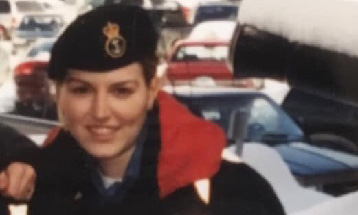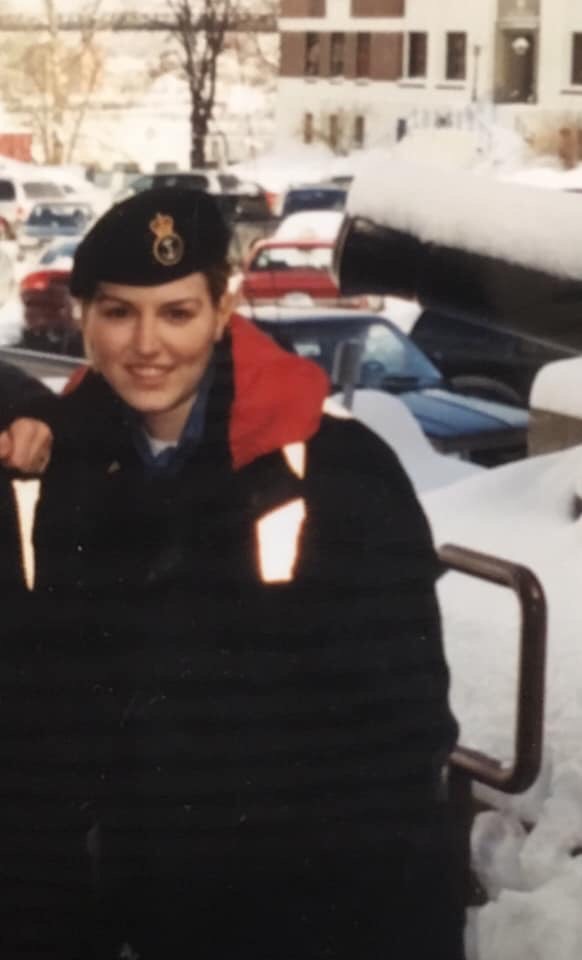“I was on the ship back in the days when it was a man’s ship only,” she says. Living in the shadow of men was something that Marie-Claude had to deal with both in her military career and in her transition to life after service. “One of the biggest challenges for me when adapting to civilian life was that my husband is also in the military. So, I went from being in the military to being a military wife,” she explains.
But a change in perspective was all Marie-Claude needed to see the positive in the midst of a challenging time.
Starting again
Marie-Claude admits the frequent moves after her release were difficult, but now she realizes there were hidden advantages. Living in different places gave her career opportunities she wouldn’t have had otherwise. Short term jobs allowed her the flexibility to take leave between contracts. She was often able to spend Christmas or summer holidays with her children.
Marie-Claude says she was more willing to take risks on jobs that people searching for full time employment might pass up. “I got training in various fields and each time I would add this in my resume.”
Her diverse work experience eventually ignited a passion for web accessibility. She learned to code on her own and prides herself on being an expert in a specialized field. “It feels good to have that expertise,” she says. “I feel valued and like I have purpose because I'm helping people that don't have easy access to online information. It's kind of another way to serve your country.”
Finding a career she was passionate about helped Marie-Claude deal with the resentment she sometimes felt watching her husband in his dream career. “I look back at my husband’s career and I’m happy for him,” she says. “I don’t have that bittersweet feeling for myself because at the end of the day the outcome ended up being successful.”
A champion for accessibility
Marie-Claude has advice to employers who want to hire Veterans: be open to everyone. “There’s a notion that all Veterans are infantrymen,” she explains. This is not true. The idea that hiring a Veteran means hiring a man of a certain age that either has post traumatic stress disorder (PTSD) or has lost a limb is outdated. Veterans release for all kinds of reasons and their needs are diverse.
“You get people releasing for different reasons that are not necessarily combat related,” she explains. “And even medical release could be for something like having diabetes or having knee problems or back problems.” In cases like the latter, workplace accommodations could be as simple as allowing for breaks to stand up once in a while.
It’s Just 700
Marie-Claude is also an advocate for sexual abuse victims. “I was impacted by military sexual trauma,” she says. “For a long time I felt that something should be done, and I always hoped somebody would do something but I didn't really want to be that person.”
That changed when an external review was conducted and she realized that 700 service members confessed to having experienced sexual misconduct.
Once again, Marie-Claude used the web skills she taught herself to create a safe and non-judgmental website that allows people suffering from military sexual trauma to group together and connect with peers.
“I created a space, but what makes it work is everyone’s contributions,” says Marie-Claude.
“It’s Just 700” is dedicated to current and past service members of the Canadian military who survived work-related sexual trauma. The group is run by Canadian volunteers also living with sexual trauma. It provides confidential, positive peer support and informs members about the tools, events and services available to them. “It's Just 700” hopes to spread healing, inspiration and awareness to its members.
Veterans Affairs Canada also offers support for anyone who has experienced military sexual trauma. Any Veteran can apply for disability benefits for trauma related to service such as PTSD or depression and anxiety. Family members can also contact VAC’s Assistance Service at any time to speak with a professional.
For anyone—especially women—transitioning, Marie-Claude emphasizes the importance of positive thinking. “Looking back now, I can say that this new unplanned career path allowed me to have a better work-life balance than the one I might have had if I stayed in the military,” she says. “I feel my life got richer in many ways from these experiences.”
Date published: 2020-02-20




